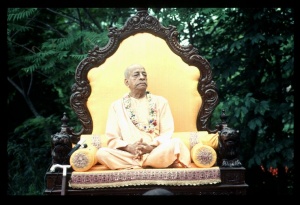CC Adi 14.90 (1975)

A.C. Bhaktivedanta Swami Prabhupada
Below is the 1996 edition text, ready to be substituted with the 1975 one using the compile form.
TEXT 90
- ei-mate duṅhe karena dharmera vicāra
- viśuddha-vātsalya miśrera, nāhi jāne āra
SYNONYMS
ei-mate—in this way; duṅhe—both of them; karena—do; dharmera—of religion; vicāra—consideration; viśuddha—unalloyed; vātsalya—parental affection; miśrera—of Jagannātha Miśra; nāhi—there is not; jāne—he knew; āra—anything else.
TRANSLATION
In this way Jagannātha Miśra and the brāhmaṇa discussed the principles of religion in the dream, yet Jagannātha Miśra was absorbed in unalloyed parental mellow and did not want to know anything else.
PURPORT
In Śrīmad-Bhāgavatam (SB 10.8.45) it is said, “Lord Kṛṣṇa, the Supreme Personality of Godhead, who is worshiped with exalted hymns by all the Vedas and Upaniṣads and by great personalities through sāṅkhya-yoga in the mode of goodness, was considered by mother Yaśodā and Nanda to be their own little son.” Similarly, Jagannātha Miśra also considered Lord Caitanya Mahāprabhu his beloved little boy, although He is worshiped with all veneration by learned brāhmaṇas and saintly persons.